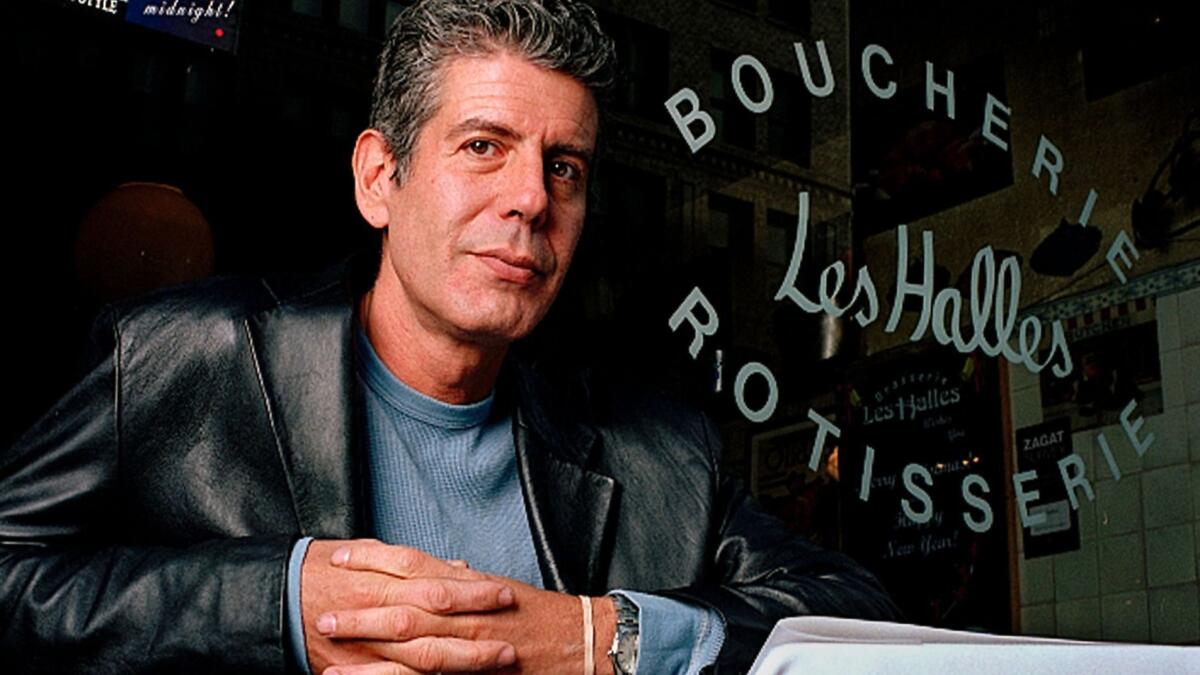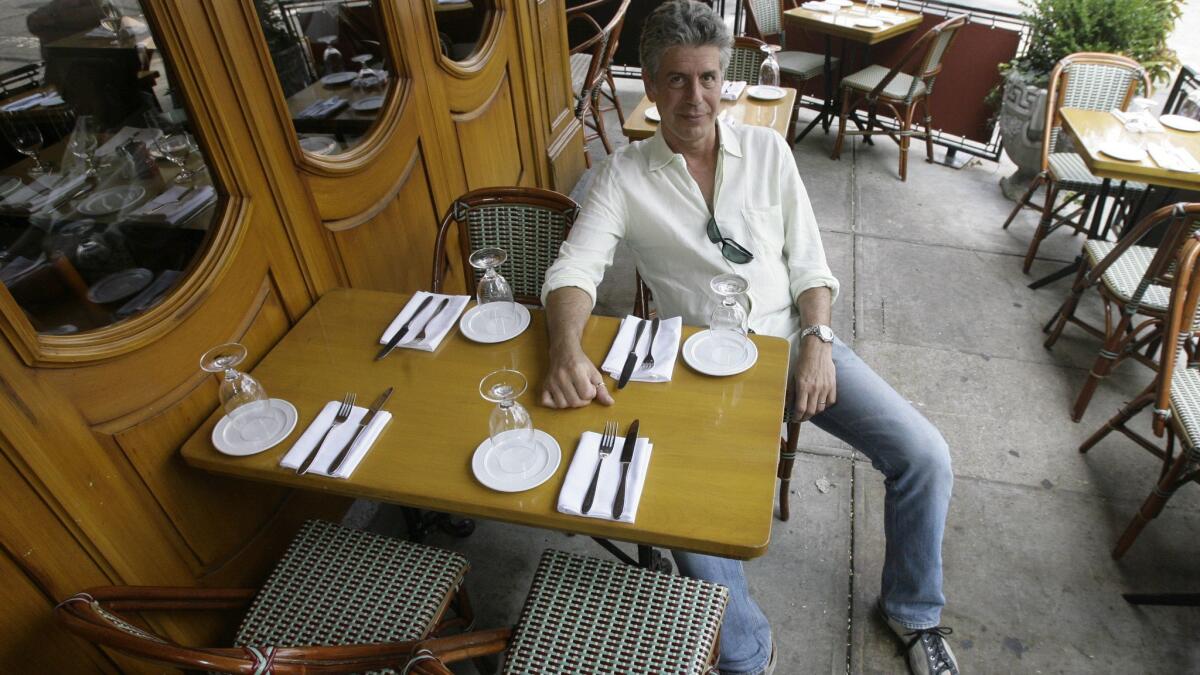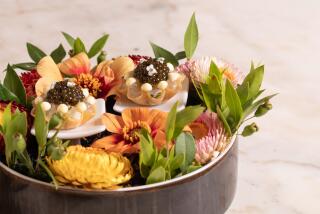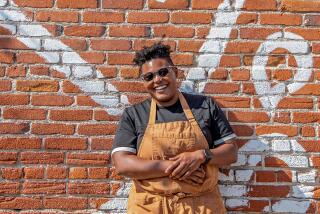Appreciation: For Anthony Bourdain, food was just the entry point for a much wider cultural discussion

I ate Anthony Bourdain’s food before I ever met him.
For a time, in the late 1990s, my husband and I happened to live around the corner from Les Halles, the small brasserie where Bourdain served as chef starting in 1998.
Les Halles wasn’t the best French restaurant in Manhattan. But it was a great neighborhood restaurant. Stuffed with locals ordering red wine and steak frites. For a time, it was our go-to for special occasions: small celebrations, a place to take out-of-town guests and, for several years running, the place we ate our Christmas Eve dinners because we were too damn lazy to cook.
It was cramped. And in summer, a little sweaty. But the mussels were solid and sometimes the maitre d’ was happily drunk — and at Christmas, he’d be decked out in a red Santa suit. Les Halles was an oasis in a neighborhood that was emptied of its office workers at night, when the blocks would be turned over to clusters of prostitutes and the artists and writers who lived in their midst. (Back then, this stretch of Park Avenue South, on the fringes of Kips Bay, had yet to experience the blandifying effects of urban renewal.)
I mentioned all of this to Bourdain when I met him earlier this year, to shoot a web episode for his CNN program “Parts Unknown.” He laughed and responded that sometimes maitre d’ Santa could also get a little smelly.
All of this made the news of his death on Friday morning, from apparent suicide, all the more difficult to digest.
Bourdain was cantankerous. He was funny. He was curious. He was a charismatic writer. And in person, he was razor-whip sharp, ready to drop cultural references high and low like a string of word bombs.
He was funny. He was curious ... and, in person, he was razor-whip sharp, ready to drop cultural references high and low like a string of word bombs.
He was also a complicated cultural figure to wrestle with: a brilliant observer who was also swashbuckling levels of macho — especially in his earlier days. (Something noted by Tamar Lewin in an essay in the New Yorker in 2012: Bourdain, she wrote, turned “good, plain meals into a demonstration of virility. For him, there is no quiet meal of tripe grated with cheese. One cannot eat in peace: In the land of Bourdain, no dinner is complete without stentorian grunting, cursing, and beating one’s chest.”)
This was something he admittedly came to regret — being part of a “meathead culture” that he helped propagate. But my interest in Bourdain wasn’t related to his gender politics. It was the lens that he used to frame his work. Bourdain wasn’t simply a food writer. He was a broad-minded, intellectually curious cultural critic.
In an age in which there is an Instagram account devoted to slavishly covering food’s every last mannerist turn, Bourdain was more interested in pulling the camera back and revealing food’s social and cultural contexts. This was not a man who’d devote his time to covering sugar cages. He was more interested in its politics.
When my former colleague Nathan Thornburgh approached me about leading Bourdain through an outdoor Guatemalan food market in the Westlake-MacArthur Park neighborhood for an online segment, I told him that he might be better off finding someone who was a Guatemalan food expert, or who, for starters, was Guatemalan. (My background is South American — and I’m always wary about U.S. media depicting Latin American nationalities as being largely interchangeable.)
But Thornburgh told me that Bourdain wasn’t interested in having someone deconstruct the food. (For that, they would interview the people who made it.) He was more interested in speaking with someone who could give him some historical and cultural context on the city and the neighborhood. That was something I could do.
And that was what inspired me about Bourdain’s work over the years. His television shows were never simply about food. They were about the landscapes and the people that shaped them. On “Parts Unknown,” he sat down for a riveting meal with Mexican investigative journalist Anabel Hernández, author of “Narcoland: The Mexican Drug Lords and their Godfathers,” to talk about the ways in which the cartels had penetrated every echelon of Mexican society.
For his earlier Travel Channel show, “No Reservations,” he hung out in Jeddah, Saudi Arabia, with Saudi American filmmaker Danya Alhamrani. The episode explored the country with humor and clear eyes — addressing issues of politics and gender inequity but without confusing the country’s everyday people with its systems of law.
It was an episode that was dear to my heart: My family lived in Riyadh for almost a year when I was a kid in the ‘70s. We had landed in the city because of my father’s work in heavy construction. U.S. television rarely, if ever, gets the nuances of Saudi Arabia right. The focus is often on corrupt Saudi royals, terrorism and the limited rights of women. All of those issues are important and real. But Saudi, to me, is also festive family parties, illicitly distilled booze and the joy of watching camel races in the desert.
In his segment, Bourdain offered a more complete picture of Saudi Arabia and its people — along with its quivering street foods.
In this way, his curiosity was relentless.
Los Angeles artist Guadalupe Rosales received an email from Bourdain in 2017, inquiring about an archival art project she was undertaking called “Veteranas and Rucas,” which chronicled Chicano youth culture of the 1990s. He reached out because he wanted to invite her to contribute an essay to the “Parts Unknown” website about the work.
Full coverage of Anthony Bourdain’s death »
Rosales told me by telephone Friday morning that she was impressed by the respect with which he and the staff of the series approached her work.
“This isn’t someone who will appropriate a culture or who is just interested in the fashion or the stereotypical clichés of living in L.A.,” she said of Bourdain’s interest. “He really wanted me to talk about my own experience in L.A.”
In shooting our segment with Guatemalan street food vendors, he was interested in knowing about the history of the neighborhood, about the ways in which the Los Angeles landscape could host tiny, thriving enclaves, about the ways in which the city was growing and developing. Food was simply the entry point for that much larger discussion.
This is a goal I’ve taken for my own work as an arts writer — to write about art and architecture not for its own sake, but as a way of understanding the forces that shape it.
I can’t claim to know Bourdain well. And I can’t claim to offer any insight into the personal demons that led him to possibly take his own life. I simply had the good fortune to eat his food and, years later, spend a solid hour talking Los Angeles with him as we munched on fried chicken and palm flower fritters. But his broadminded curiosity will remain with me always.
And that’s where his greatest achievement lies: Anthony Bourdain made us all just a bit more curious about the world.

If you or a loved one is considering suicide, please call the National Suicide Prevention Lifeline at (800) 273-8255.
ALSO:
Jonathan Gold: Anthony Bourdain opened the working-class kitchen to the world and the world to us
Anthony Bourdain wasn’t just a food lover — he was a music freak, too
CNN, Travel Channel will salute Anthony Bourdain with slate of weekend programming
Critics Pick: ‘United Shades of America,’ ‘Parts Unknown,’ ‘My Nazi Legacy’
Eat what Obama and Bourdain ate: Where to find great bun cha ha noi
Obama and Bourdain’s dining table memorialized in Hanoi
From In-N-Out to Chateau Marmont, Anthony Bourdain understood what makes L.A. great
Anthony Bourdain, world-traveling chef and TV star, dies at 61 in apparent suicide
Books were good to Anthony Bourdain — but TV was even better
Anthony Bourdain was the eternal compadre of overlooked Latinos
Anthony Bourdain’s death stuns girlfriend Asia Argento and celebrity admirers
Sign up for our weekly Essential Arts & Culture newsletter »
Anthony Bourdain, world-traveling chef and TV star, dies at 61 in apparent suicide
Anthony Bourdain’s death stuns girlfriend Asia Argento and celebrity admirers
More to Read
The biggest entertainment stories
Get our big stories about Hollywood, film, television, music, arts, culture and more right in your inbox as soon as they publish.
You may occasionally receive promotional content from the Los Angeles Times.











